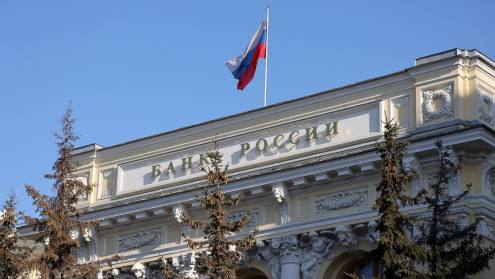Ukraine’s stock market is soaring but is still dogged by low liquidity and mistrust. Foreign investors make up the bulk of portfolio investment and while they have already doubled their money in the past two years, most are in for the long term and are not selling yet. Ukrainian businessmen are becoming more interested in their stock but are acutely aware of political risks; owners are being cautious.
The Ukrainian market follows closely at the heels of Russia’s RTS, which was booming until the edge was knocked off returns by a political scandal involving the Yukos oil company.
As the RTS broke record highs and approached analysts’ fair value estimates, portfolio investors’ attention turned from Moscow to Kiev in the hunt for more strong gains. Bad PR and uneven progress in reforms means that Ukraine’s leading 10 blue chip stocks trade at a 30%-80% discount to their Russian peers but have already started to catch up.
Market awakens
“The market woke up in the middle of last year,” says Tamash Fiala, the director of Dragon Capital, a leading Ukrainian brokerage. “Things were quiet after the Russian crisis, but with strong economic growth and the fact that the RTS reached fair value, investors started looking further afield.”
The leading PFTS (First Stock Trading System) index has more than doubled since 2002 and rose to reach 85.4 in March this year. But growth remains restricted by the limited liquidity and continuing poor corporate governance. The government has also failed to enact guarantees to ensure transparency and protect minority shareholders’ rights.
However, the capitalisation of Ukraine’s stock market is rising on the back of strong economic growth and was up by a tenth last year to Hrv25.4bn ($4.9bn) – about 10% of GDP.
Between eight and 10 stocks are heavily traded and the biggest company on the exchange is Ukrtelecom, the state-owned fixed-line operator, which has a market capitalisation of $1.2bn and accounts for two out of five trades by volume. Ukrnafta, the state-owned oil company is the next largest company, worth $244m. The privatised power generators make up a third tier: Centrenergo, Dniproenergo and Kyivenergo each have market capitalisations of $65m-$87m.
After the state’s power monopoly was broken up a few years ago, the power sector should be attractive for foreign investors, who account for $8 out of every $10 invested into Ukrainian stocks. However, the lack of liquidity has held back market development.
The government has been pushing privatisation but the free floats of most companies remain small. And, now that the economy is growing and owners have begun to invest into their companies, the leading industrial groups’ general consolidation of control has reduced free floats even more.
Change of behaviour
“When privatisation started, the real owners of companies emerged and recently have been consolidating their ownership. Now they have started to invest in these companies,” says Mr Fiala. “Corporate governance in Ukraine is about the same as in Russia three years ago: companies are starting to behave well and think about improving their corporate governance. But, despite the consolidation, oligarchs are still holding their cards close to their chest.”
For example, only 7% of Ukrtelecom was privatised and today the management owns 5%, leaving 2% free float. Ukrnafta is one of the most obvious targets for foreign investors but after the state privatised half the company, 40% was snapped up by leading Ukrainian banking groups, leaving a 10% free float.
Still, as Ukraine has mirrored Russia’s experience so closely for the past few years, brokers are getting excited and expect the market to develop rapidly.
“Ukraine looks like Russia did just before [former president Boris] Yeltsin stepped aside and ushered in a new era,” says Alexei Moisseev, Renaissance Capital’s economist. “The presidential elections in October could mark the start of a new era and we are expecting it to follow a very similar path to Russia: a period of prolonged consolidation, improving corporate governance and rapid growth.”











